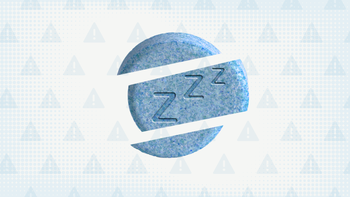
Alcohol and Sleep Aids Don’t Mix: The Do’s and Don’ts of Taking OTC Sleep Aids
Key takeaways:
If you can’t sleep, over-the-counter (OTC) sleep aids like diphenhydramine (ZzzQuil, Benadryl), doxylamine (Unisom), and melatonin might help. But there are a few things to know about taking them safely.
Avoid mixing OTC sleeping pills with alcohol and other medications that make you drowsy. And don’t take them long term without your healthcare provider’s OK.
You may feel groggy the morning after taking sleep medications. So, it’s best to only take them if you’re able to rest for a full 6 to 8 hours. And if you’re over the age of 65, they may not be a safe option for you.
Table of contents

Few things are as frustrating as being unable to get a restful night of sleep. Unfortunately, insomnia (trouble falling asleep, staying asleep, or both) is extremely common. As many as 1 in 3 adults experience insomnia each year.
Sometimes, managing health conditions that are keeping you awake, like chronic pain or anxiety, can help. Other times, making simple lifestyle changes — also known as sleep hygiene — can raise your chances of a restful night. These habits include limiting caffeine and alcohol intake before bed, creating a consistent bedtime routine, and exercising regularly, among others.
But if these changes don’t seem to improve your sleep, you may consider an over-the-counter (OTC) sleep medication. These products commonly contain diphenhydramine (ZzzQuil, Benadryl), doxylamine (Unisom), or melatonin. But there are a few things to know before taking an OTC sleeping pill.
Search and compare options
Let’s take a look at some of the do’s and don'ts you should know about.
1. Avoid drinking alcohol while taking OTC sleeping pills
Avoid mixing sleep medications and alcohol. Many OTC sleep aids cause drowsiness to help you fall asleep. Alcohol also has this effect. Combining the two could cause excessive drowsiness. This puts you at risk of falls if you need to get up at some point during the night. It can cause confusion and make it harder for you to think clearly, too.
Combining alcohol and OTC sleeping pills can also make you feel groggy in the morning or make it harder to wake up. This can be especially risky if your OTC sleep medication has diphenhydramine or doxylamine in it.
Mixing sleeping pills and alcohol may be particularly dangerous if you’re over the age of 65. Older adults may be more sensitive to these side effects than others.
Good to know: Alcohol may seem like a useful option to help you fall asleep, but it does more harm than good. Alcohol can interrupt your sleep stages and lower the quality of the sleep you get. It’s best to try and limit alcohol intake if you’re having trouble sleeping.
2. It’s best to avoid combining certain medications with OTC sleep medications
Avoid mixing sleep aids with other medications that may make you drowsy. Like alcohol, this combination could cause excessive drowsiness that may be harmful.
Examples include:
Prescription medications for pain, such as opioids or muscle relaxants
Benzodiazepines, such as alprazolam (Xanax)
Prescription insomnia medications, such as zolpidem (Ambien)
OTC cough and cold medications that contain antihistamines, such as NyQuil Cold and Flu (acetaminophen / dextromethorphan / doxylamine)
3. You shouldn’t take OTC sleep medications for longer than recommended
Tolerance to most OTC sleep medications develops quickly. This means that taking them every day may make them less effective. For medications like diphenhydramine, some studies report tolerance within as few as 4 days of use.
Plus, a recent study also reported a greater risk of dementia with more frequent use of medications found in many OTC sleep medications, such as diphenhydramine and doxylamine.
It’s also recommended not to take most OTC sleep medications for longer than 2 weeks at a time. If your insomnia symptoms last longer than that, it’s time to speak to a healthcare provider. They’ll help you find out if something else is causing your insomnia and help decide on the best treatment option for you.
Good to know: Melatonin is an exception to this rule. It doesn’t seem to cause tolerance when you take it long term. But you shouldn’t take it for more than 6 months without your healthcare provider’s OK.
4. You may need to avoid OTC sleep medications altogether if you’re over 65
OTC sleep medications that contain diphenhydramine or doxylamine are listed on the Beers Criteria for possibly inappropriate medication use in older adults. This means they’re considered a medication that older adults should avoid, if possible. That’s because there’s a greater risk of side effects, such as confusion and constipation, that can be more harmful for this age group.
These types of OTC sleep aids also raise the risk of drug interactions, dizziness, and falls in older adults. So in most cases, it’s best to avoid them if you‘re over the age of 65.
While melatonin is generally considered safer than other sleep aids, it still carries a small greater risk of fractures. It’s best for older adults to take low doses of melatonin as needed — not long term — to lower the risk of this rare side effect.
5. You may feel groggy the day after taking OTC sleeping pills.
OTC sleep medications may make you feel groggy the next day. Especially if you aren’t able to rest for a full 6 to 8 hours after you take them.
As mentioned, avoid combining OTC sleeping medications and alcohol to help prevent this side effect. Also, avoid driving a motor vehicle or operating other forms of heavy machinery if you don’t feel fully awake the morning after taking an OTC sleeping medication.
If taken as directed, occasional use of OTC sleep medications can improve your daytime alertness by helping you get a restful night’s sleep. But it’s best practice to only take them if you’re able to rest for a full 6 to 8 hours.
6. Know when to contact your healthcare provider
If sleep hygiene adjustments and OTC sleep medications haven’t helped, it’s time to call a professional. Speak to a healthcare provider about your options. This could include trying a prescription medication. You can also see a sleep specialist to find out any underlying medical causes of your sleep problems.
You should also contact your healthcare provider if you need to take OTC sleep medications for more than 2 weeks (6 months for melatonin). And be sure to let them know if you experience extreme dizziness, drowsiness, or confusion from an OTC sleep medication.
The bottom line
If you’re living with insomnia, OTC sleep medications might seem like an easy solution. But it’s important to use them wisely. Don’t mix OTC sleeping pills with alcohol or other medications that make you drowsy. Only take them if you’re able to rest for a full 6 to 8 hours. And don’t take them long term without your healthcare provider’s OK.
Keep in mind that you may feel groggy the morning after taking OTC sleep medications. And if you’re over the age of 65, you may be more sensitive to side effects like dizziness or confusion. If you have questions about OTC sleep aids, talk to your healthcare provider or pharmacist for guidance.
Why trust our experts?



References
2023 American Geriatrics Society Beers Criteria® Update Expert Panel. (2023). American Geriatrics Society 2023 updated AGS Beers Criteria for potentially inappropriate medication use in older adults. Journal of the American Geriatrics Society.
Albert, S. M., et al. (2017). Sleep health and appropriate use of OTC sleep aids in older adults—recommendations of a Gerontological Society of America Workgroup. The Gerontologist.
Ferracioli-Oda, E., et al. (2013). Meta-Analysis: Melatonin for the treatment of primary sleep disorders. PLoS One.
Gray, S. L., et al. (2015). Cumulative use of strong anticholinergics and incident dementia: A prospective cohort study. JAMA Internal Medicine.
Lie, J. D., et al. (2015). Pharmacological treatment of insomnia. P&T: A Peer-Reviewed Journal for Formulary Management.
National Institute on Alcohol Abuse and Alcoholism. (2014). Harmful interactions: Mixing alcohol with medicines.
Pacheco, D. (2023). Alcohol and Sleep. Sleep Foundation.
Papillon-Ferland, et al. (2018). Should melatonin be used as a sleeping aid for elderly people? The Canadian Journal of Hospital Pharmacy.
Proctor, A., et al. (2012). Clinical pharmacology in sleep medicine. ISRN Pharmacology.
Roehers, T., et al. (n.d.). Sleep, sleepiness, and alcohol use. National Institute on Alcohol Abuse and Alcoholism.

























